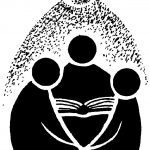Ordinary Season of the Year. (a)
Weekdays – Year 1
Sunday 10th September: Twenty-Third Sunday of the Year. (a)
The first reading is from the Prophet Ezekiel. He is reminded that the appointed leaders bear the responsibility to point to wrongdoers the error of their ways and to try to persuade them to change their ways.
St. Paul, writing to the Romans, reminds us that, if we truly love our neighbour, we would not wish to harm them in any way.
Jesus reminds us, in the Gospel, about the duty of a Christian to correct someone who is doing wrong. There is a correct way to do this. It must be done in love.
Monday 11th September: Monday of the 23rd week of the year.
St. Paul begins this passage in his letter to the Colossians with a new insight. The difficulties and sufferings endured by Paul help the Church to grow and deepen and he is in fact sharing in the suffering of Christ himself. Christ is not just for the Jews but for all.
The Gospel shows how the Pharisees twisted the Law of Moses regarding the Sabbath. Jesus challenges this by showing that he was doing good and saving life by his actions.
Tuesday 12th September: Tuesday of the 23rd week of the year.
Paul continues his correction of the faults of the people at Corinth. He stresses that when disputes are not settled out of court then love has died and Christians have ceased to be Christian.
The importance of prayer is stressed in the Gospel. Jesus, as he often did, goes to a quiet place to pray before he makes and important decision. This time he chooses the apostles after his time of prayer. They travel with him and watch, listen and learn from him about the Good news.
Wednesday 13th September: Memorial of St. John Chrysostom
John was born in Antioch in 347. He gained a reputation as a powerful preacher. His name means ‘Golden Mouth.’ According to the custom of the time, he was not baptised until he was about twenty. He was a hermit for a number of years before becoming a priest. In 398, he became Archbishop of Constantinople and worked very hard for the poor and for the reform of his clergy. He denounced abuse wherever he found it, including the court of the Emperor. As a result, he was banished and died in exile in 407.
Thursday 14th September: Feast of the Exaltation of the Cross. (a)
This feast has its origin in Jerusalem, where from the fifth century the wood of the true cross used to be shown to the people the day after the feast of the dedication of the Basilica of the Resurrection. It was celebrated in Rome by the seventh century and stresses the victory and triumph of the cross of Christ.
Friday 15th September: Memorial of Our Lady of Sorrows.
Within the octave of the feast of the birth of Our Lady, we commemorate her sorrows, above all the sorrow of witnessing her son’s death and resurrection on the cross. This feast was first celebrated in the seventeenth century by the members of the Servite Order.
Saturday 16th September: Feast of St. Ninian.
He was born around 360 in Cumbria and was ordained Bishop in Rome in 394. He came to Scotland and made Whithorn in Galloway his base as he preached the gospel in southeast Scotland. He died in 432.
Father, in your Son Jesus Christ
You have chosen what is poor and weak in this world
To be rich in faith and love and to be heirs to your kingdom.
Speak through us
Deeds of mercy and hope
For you have healed and freed us all.
We ask this through Christ our Lord.
Amen.
